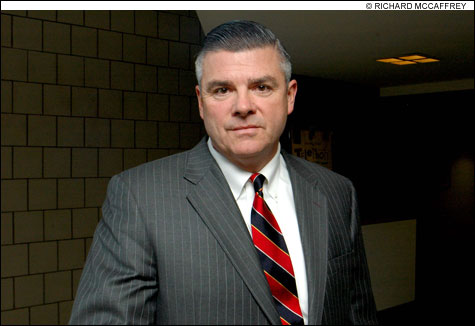
TOP COP: Doherty and other members of the state police maintain a close eye on the remnants
of La Cosa Nostra inn Rhode Island. |
The arrest of 17 people last week as part of "Operation Mobbed Up" — as well as the subsequent discovery in East Providence of human remains thought to be those of Joseph "Joe Onions" Scanlon — put front and center the bygone days of the Rhode Island Mob.
In its heyday, the operation run by Raymond L.S. Patriarca from an Atwells Avenue storefront controlled organized crime in all of New England. Yet by the time when Brendan Doherty joined the Rhode Island State Police in the mid-'80s, the once-fearsome strength of Italian-American gangsters was already in decline, thanks to RICO prosecutions, Mob turncoats, and law enforcement wiretaps, among other things.
As the superintendent of the Rhode Island State Police, a post he moved into last year, Doherty seems more concerned these days about the prevalence of youth crime in Providence and the Ocean State's other cities.
As it stands, the Rhode Island branch of La Cosa Nostra is down to eight or nine reputed "made" members, about a third of the size of the membership during the heyday of the Patriarca family, and some of them are more or less retired, Doherty says. While the colonel maintains hopes of completely stamping out organizing crime in the state, doing away with juvenile violence will remain far more complicated.
The following interview was condensed from Doherty's November 23 appearance on WPRI/WNAC-TV's Newsmakers (in which questions were also asked by host Tim White and my co-panelist, Arlene Violet), and from a separate interview with the superintendent.
WHAT LED YOU TO PURSUE A CAREER IN LAW ENFORCEMENT?
My grandfather was a detective in Taunton, Massachusetts. His name was Jack Flynn. I was just enamored by the stories he would tell. He never pushed me toward law enforcement, my parents never did. As a matter of fact, my father was a dentist and wanted me to become a dentist like he, his brother, his uncle, and the rest of the family.
I saw a Rhode Island state trooper once when I was in college. I was at Rhode Island College, and I saw atrooper, and I just thought he was so squared away looking, so sharp, and just had command presence. And when I met a trooper, the trooper I met with was so professional and comported himself with so much dignity and integrity, I thought this is a career that I might be interested in. I looked into it a little bit, and I applied. I was young — I was 20 years old when I applied. As a matter of fact, in my class, Steven Pare — who ended up as a colonel as well — we were the youngest two in our academy.